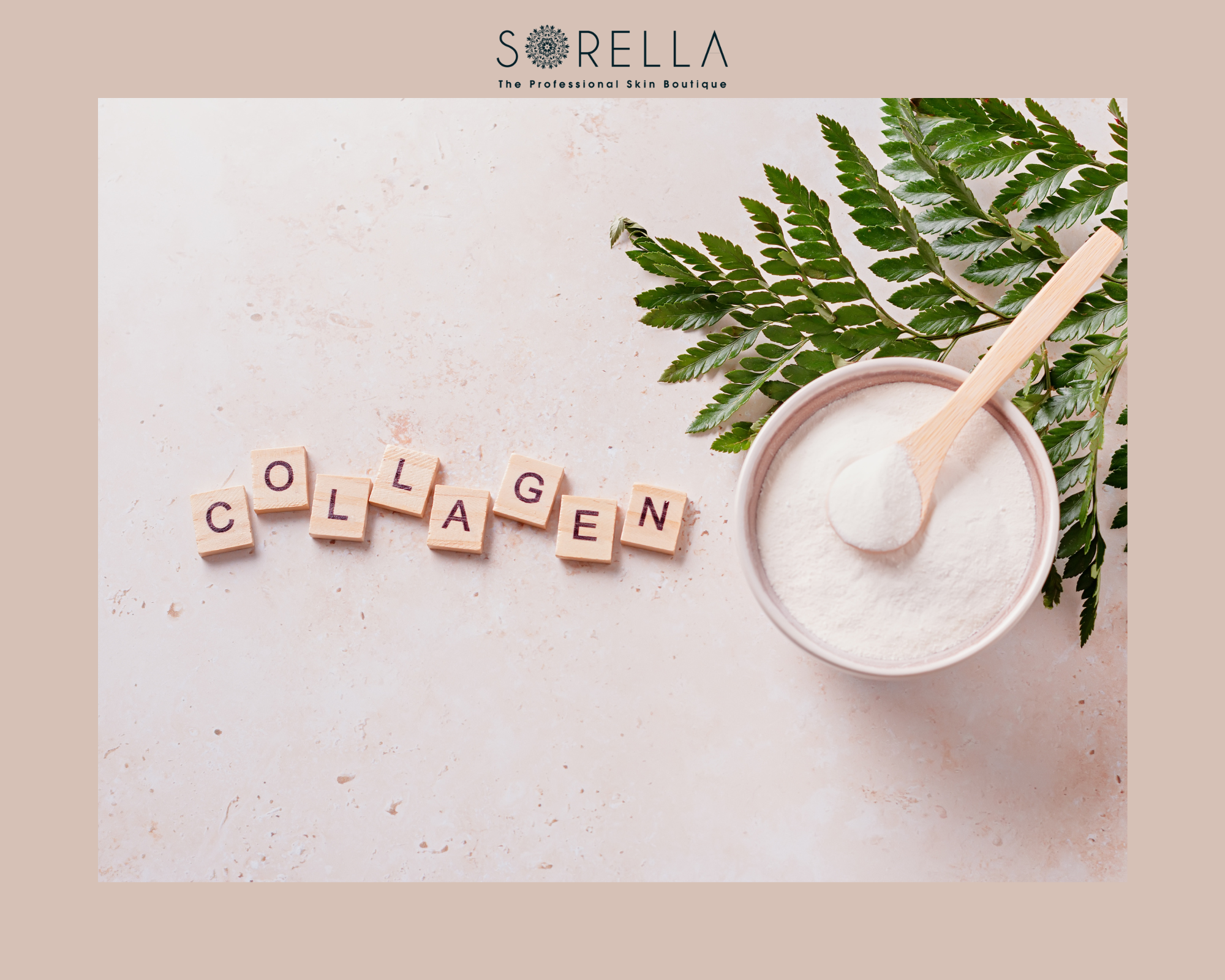Uncategorized
The Top 6 Advantages of Taking Collagen Supplements
Collagen is a protein that is found in bones, skin, muscles, and other bodily tissues. People frequently use collagen supplements to aid with skin health, among other things, but does it work? As a high school wrestler, I always utilized whey protein concentrate after workouts to aid muscle repair and development.
Fast forward to college, when I stopped wrestling and began bodybuilding, but I continued to consume whey protein concentrate after my workouts. I didn’t discover a new type of protein called collagen until my sophomore year of college while researching for a class.
At the time — ideally, this doesn’t age me! — there was little or no study on collagen and its supposed advantages. However, a large body of high-quality studies now confirms collagen’s benefits.
Here are six scientifically proven health advantages of collagen supplementation.
What exactly is collagen?

Collagen is your body’s most common protein.
It is the primary component of connective tissues, which include tendons, ligaments, epidermis, and muscles.
Collagen serves a variety of purposes, including giving structure to your epidermis and strengthening your bones.
There are 28 different kinds of collagen, but these are the four most prevalent.
- Type I: the most prevalent and can be found in all fibrous tissue.
- Type ll: located in joints and intervertebral discs (the cushions that act as stress absorbers in your vertebrae).
- Type ll: the primary component of reticular fibers present in the epidermis and blood vessels.
- Type lV: a protein found in your kidneys, inner ear, and ocular lens.
Collagen products have grown in popularity in recent years. The collagen has been hydrolyzed, which means it has been broken down to make it simpler to ingest.
These nutrients are mainly sold in powder form, but capsules are also available. Collagen varieties found in supplements differ; some contain only one or two forms, while others contain up to five.
Pork skin and bone broth are two foods that can easily increase your collagen consumption.
Collagen-containing foods
Collagen is found in foods containing gelatin, such as bone soup. Gelatin is a protein material made from processed collagen.
Incorporating collagen-containing foods into your diet is a natural and effective way to boost your body’s collagen production and enjoy the associated health benefits. While collagen is primarily found in animal-derived sources, there are also plant-based options available. Here are some collagen-rich foods you can include in your diet:
- Bone Broth: Bone broth is made by simmering animal bones and connective tissues. It is a rich source of collagen, along with other nutrients like amino acids, minerals, and gelatin. Enjoy a warm cup of homemade bone broth or use it as a base for soups and stews.
- Fish: Fish, especially those with edible bones like salmon and sardines, are excellent sources of collagen. Consuming fish regularly can provide you with collagen peptides and omega-3 fatty acids, which further support skin and joint health.
- Chicken: Chicken, particularly the skin and cartilage, contains collagen. Including chicken in your diet, such as roasted chicken or chicken bone broth, can help boost your collagen intake.
- Eggs: Egg whites, in particular, contain collagen. Enjoying eggs in various forms, such as omelets or boiled eggs, can provide you with the essential amino acids needed for collagen production.
- Citrus Fruits: Citrus fruits like oranges, lemons, and grapefruits are rich in vitamin C. Vitamin C plays a crucial role in collagen synthesis, so including these fruits in your diet can support collagen production.
- Berries: Berries such as strawberries, blueberries, and raspberries are packed with antioxidants that help protect collagen from damage caused by free radicals. Add them to smoothies, or yogurt, or enjoy them as a snack.
- Leafy Greens: Dark leafy greens like spinach, kale, and collard greens contain chlorophyll, which can promote collagen production. These greens are also rich in vitamins and minerals that support overall skin health.
- Nuts and Seeds: Almonds, walnuts, flaxseeds, and chia seeds are examples of nuts and seeds that provide essential fatty acids and antioxidants. These nutrients are beneficial for collagen synthesis and overall skin health.
Remember, while consuming collagen-rich foods can support collagen production, it’s important to maintain a balanced diet that includes a variety of nutrients. Additionally, if you’re considering collagen supplementation, consult with a healthcare professional for guidance on the right approach for your specific needs.
Collagen is present in mammal connective structures. Collagen can be found in poultry skin, pig skin, beef, and seafood.
Because vitamin C is required for collagen production, you should consume foods high in this vitamin, such as citrus fruits, asparagus, and bell peppers.
More study is required to establish whether consuming collagen-rich foods aids in the rise of collagen levels in the body, as they may not provide the same advantages as supplements.
Digestive enzymes degrade dietary collagen into individual amino acids and peptides. However, collagen in supplements has already been broken down, or hydrolyzed, and is therefore believed to be more effectively taken than collagen from foods.
Overall, Collagen is your body’s most common protein. You can boost your collagen consumption by taking supplements or consuming animal meals and bone broth. However, absorption from meals may be less effective than absorption from supplements.
The Health Advantages of Collagen Supplements

Collagen supplements have gained significant popularity in recent years and for good reason. The health advantages of collagen supplements are numerous and diverse, making them a valuable addition to one’s daily routine.
First and foremost, collagen is a protein that plays a crucial role in maintaining the health and structure of our skin, hair, nails, joints, and connective tissues. As we age, our natural collagen production declines, leading to various signs of aging such as wrinkles, sagging skin, and joint discomfort. Collagen supplements can help replenish the collagen levels in our bodies, promoting skin elasticity, reducing the appearance of wrinkles, and supporting joint flexibility.
Beyond its impact on physical appearance, collagen supplements also contribute to overall joint health and mobility. Collagen is a key component of our cartilage, the flexible tissue cushions our joints. By consuming collagen supplements, individuals may experience reduced joint pain and improved joint function, making it particularly beneficial for those with arthritis or joint-related conditions.
Collagen supplements have also been linked to improved bone health. Collagen provides structural support for our bones, and supplementing with collagen may help enhance bone density and reduce the risk of conditions such as osteoporosis.
Additionally, collagen supplements can support gut health. The amino acids found in collagen help maintain the integrity of the gut lining and promote a healthy digestive system. This can aid in reducing inflammation, supporting proper nutrient absorption, and alleviating digestive issues.
Furthermore, collagen supplements have shown potential benefits for hair and nail health. By providing the necessary building blocks for hair and nail growth, collagen can help enhance their strength, thickness, and overall condition.
It is important to note that while collagen supplements offer various health advantages, results may vary among individuals. It is advisable to consult with a healthcare professional before incorporating collagen supplements into your routine, especially if you have any underlying medical conditions or are taking other medications.
It has the potential to enhance epidermis health
Collagen is an essential component of your epidermis.
It aids in the fortification, suppleness, and hydration of the epidermis. As you get older, your body creates less collagen, which causes dry skin and creases.
Several studies, however, have shown that collagen peptides or collagen supplements may help delay the aging of your face by decreasing creases and dryness.
One analysis of 11 studies, mostly concentrating on women, discovered that consuming 3-10 grams of collagen per day for an average of 69 days improved skin elasticity and hydration.
These nutrients may work by boosting your body’s natural collagen production. Collagen supplements may also stimulate the creation of other proteins that help shape your skin, such as elastin and fibrillin.
Many anecdotal claims that collagen supplements help avoid acne and other skin conditions are also unsubstantiated by scientific proof.
It has the potential to alleviate joint discomfort
Collagen aids in the preservation of cartilage, the rubbery tissue that shields your joints.
Your chance of degenerative joint disorders such as osteoarthritis rises as the quantity of collagen in your body diminishes with age.
Some research suggests that collagen supplements may help better osteoarthritis symptoms and decrease general joint pain.
An analysis of research in individuals with osteoarthritis discovered that collagen significantly improved joint stiffness and general osteoarthritis symptoms.
Supplemental collagen, according to researchers, may collect in cartilage and encourage your tissues to produce collagen. As a result, there may be less inflammation, improved joint support, and less discomfort.
Despite the promising findings, experts warn that more proof is required before suggesting collagen as a treatment for osteoarthritis.

It has the potential to avoid bone loss
Your bones are primarily composed of collagen, which provides shape and support.
Bone density deteriorates with age in the same way that collagen does. This can contribute to conditions like osteoporosis, which is defined by poor bone density and an increased chance of bone fractures.
According to research, collagen supplements may help prevent bone disintegration that contributes to osteoporosis.
In a 12-month trial, postmenopausal women were randomly assigned to receive either a calcium and vitamin D supplement containing 5 grams of collagen or a calcium and vitamin D supplement containing no collagen.
After the research, those who took the calcium, vitamin D, and collagen supplements had lower blood levels of proteins that encourage bone breakdown than those who only took calcium and vitamin D. The collagen group also had a lower bone mineral mass decline.
Another trial of 66 postmenopausal women who took 5 grams of collagen daily for 12 months found identical findings. Compared to those who did not take collagen, those who did show a rise in bone mineral density (BMD) of up to 7%.
BMD is a measurement of the abundance of elements in your bones, such as calcium. Low BMD is linked to fragile bones and an increased chance of osteoporosis.
Although these findings are encouraging, more human research is required.
Muscle density may be increased
Collagen is an essential component of skeletal muscle because it is the most common protein in the body.
Collagen supplements may assist individuals with sarcopenia, or the decline of muscular density that occurs with age, according to research.
In a 12-week trial, 27 older males with this disease were given 15 grams of collagen while exercising. They acquired considerably more muscle mass and power than guys who exercised but did not consume collagen.
According to researchers, supplemental collagen may support the synthesis of muscle proteins such as creatine and stimulate muscular development after exercise.
However, collagen protein is not more efficient than whey protein in terms of muscle or strength development. This is because collagen contains fewer branched-chain amino acids, which are essential for muscular growth. Whey protein contains more of these amino acids.
More study is needed to explore collagen’s ability to increase muscular mass.
May benefit cardiac health
Collagen supplements, according to researchers, may help decrease the chance of heart disease.
Collagen helps to shape your arteries, which are the blood tubes that transport blood from your heart to the rest of your body. Without enough collagen, vessels may lose flexibility and elasticity.
This can contribute to atherosclerosis, a condition marked by artery narrowing. This disease can result in a heart attack or a stroke.
31 healthy individuals took 16 grams of collagen every day for six months in a study. From the start of the research to the conclusion, they encountered a significant decrease in artery stiffness measurements.
Furthermore, their HDL (good) lipid values increased by 6% on average. HDL is a significant risk factor for cardiac disease, including atherosclerosis.
Nonetheless, more research on collagen nutrients and cardiac health is required.
Other health advantages
Other health advantages of collagen pills have not been thoroughly researched.
- Nails and hair. Collagen supplementation may strengthen your cuticles by avoiding brittleness. It may also help your hair and nails grow longer.
- Gut wellness is important. Despite the lack of empirical proof, some health practitioners believe that collagen supplements can cure the leaky gut syndrome, also known as intestinal permeability.
- The state of one’s brain. Although no studies have been conducted to investigate the function of collagen supplements in brain health, some individuals claim that they boost mood and decrease anxiety symptoms.
- Weight reduction. Collagen supplements, according to proponents, may encourage weight reduction and a faster metabolism. However, no studies have been conducted to back up these assertions.
Although these possible impacts appear to be encouraging, more study is required before formal conclusions can be reached.
Collagen supplements have several advantages for skin, joint, bone, muscular, and cardiac health. There is little proof to back collagen’s alleged benefits on weight reduction, gut health, or brain health.

The disadvantages and adverse effects of collagen supplements
Collagen supplements are usually well tolerated, with few adverse effects recorded.
Some supplements, however, are derived from prevalent dietary allergens such as seafood, shellfish, and eggs. Individuals who are allergic to these items should avoid collagen supplements containing these components.
Some people experience dizziness and bloating after taking collagen supplements, but study has not reliably demonstrated these as adverse effects.
Collagen pills have been linked to a variety of digestive adverse effects, including indigestion and sensations of fullness.
Regardless, these supplements appear to be secure for the vast majority of individuals.
Mild adverse effects of collagen pills include bloating, heartburn, and sensations of fullness. If you are allergic to certain foods, make sure to buy vitamins that do not contain those toxins.
Collagen change is a time-consuming procedure. As a consequence, regardless of your objective for using collagen, it will take at least 8 weeks to see noticeable effects.
Most studies use a minimum of 8 weeks to evaluate collagen’s impacts on skin health and joint pain alleviation, but other studies, such as bone health, use lengthier periods, such as 12 months.
As a consequence, you should be patient and wait for outcomes.
Allow at least 8 weeks of daily collagen supplementation before determining whether collagen is effective for you.
Animal-free collagen substitutes
Because the amino acid composition of collagen varies from that of other proteins, the available options are restricted.
Vegan collagen can be created through the use of genetically engineered yeast and microbes. To accomplish this, four human collagen-coding genes are introduced to the genetic makeup of these sources, which then produce their collagen.
Some microbes naturally contain proteins that are comparable to collagen. These are being researched as possible collagen supplies.
Supplements containing the main amino acids involved in collagen production — glycine, lycine, and proline — are also available. These amino acids are obtained from veggie sources in some products.
They may also contain vitamin C and hyaluronic acid, which aid in the retention of water in your tissues, keeping them moisturized and wet.
Keratin
the structural protein found in hair, nails, and skin, has been proposed as an option for collagen, but studies on keratin products for anything other than topical application on skin and hair are restricted.
Keratin is not vegan because it is obtained from animal feathers, wool, and antlers.
Because collagen’s amino acid composition differs from that of other proteins, the options are restricted.
In conclusion
Collagen supplements have several health advantages and very few known dangers.
Supplements can help you build muscle, avoid bone loss, alleviate joint discomfort, and improve your skin’s health by decreasing wrinkles and dryness.
While there may be other advantages, most statements about weight reduction, gut health, and mental health are unsubstantiated by studies.
Although collagen can be found in a variety of foods, it is unclear whether these foods provide the same advantages as supplements.
Collagen supplements are usually secure, simple to use, and worthwhile to attempt depending on your health objectives.
Tư vấn chuyên môn bài viết:
TS.BÁC SĨ NGUYỄN HỮU QUANG
Here are the articles that Sorella shares about beauty knowledge you can refer to:
Surgical vs. Non-Surgical Facial Rejuvenation Procedures 2023
Freckles Treatment: 7 methods to get rid of Freckles
Massage Therapy: All You Need to Know in 2023
12 Things You Should Know About Laser Hair Removal Before Getting It
All you need to know about eyelid surgery in 2023
Inflammatory Acne: Symptoms, Types, Causes, and 3 ways to Treatment
- Nâng ngực nội soi Harmonic là gì? 1 số điều quan trọng cần biết
- Da nhiễm corticoid là gì? 1 số phương pháp chữa trị da nhiễm corticoid
- Nên tẩy trang khi nào mỗi ngày? Mấy lần là đủ? 1 số cách tẩy trang đúng nhất
- 7 phương pháp để xóa sẹo lõm lâu năm và lấp đầy sẹo hiệu quả
- 9 cách chăm sóc móng chắc khỏe cho các chị em phụ nữ


 中文 (中国)
中文 (中国) 한국어
한국어 English
English




